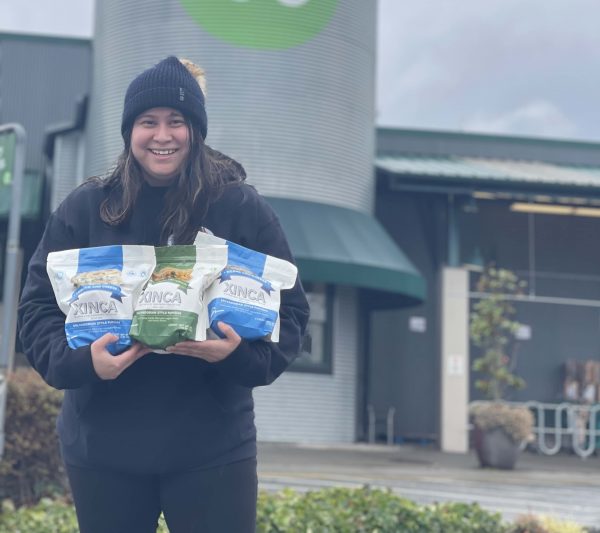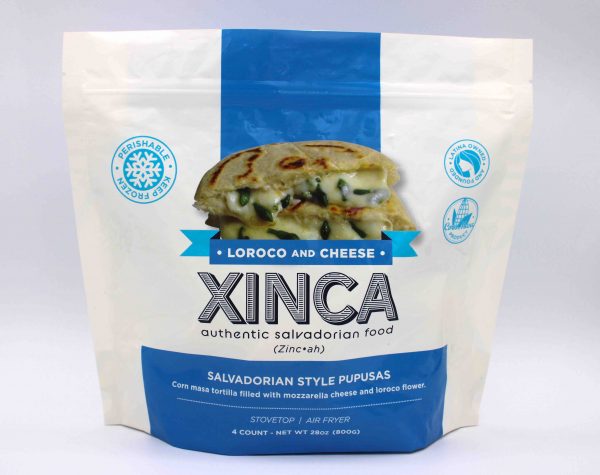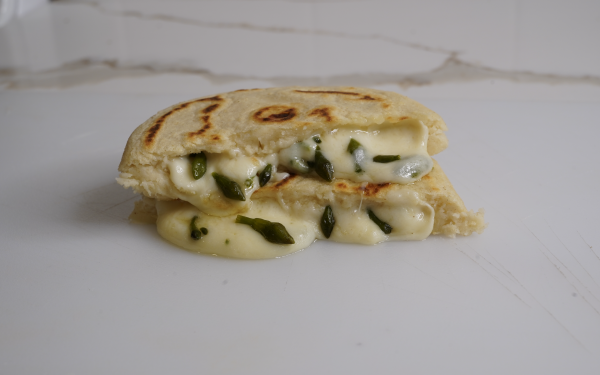Founder Friday Feature:
Cynthia Duran of Xinca Foods

Meet Xinca Foods: the brand bringing Salvadorian food to American freezers
Cynthia Duran, the founder of Xinca Foods, was perfectly happy working her “cushy” job as a data analyst for Microsoft. Except for one thing: she missed the food she grew up eating as a Salvadorian American. She says, “Whenever I would visit my mom, she would send me home with frozen pupusas because it was tough for me to find easy-to-make Salvadorian food.” Considering this shortage of options, Cynthia began to wonder what it would look like to create a Salvadorian food brand of her own. She says, “I wanted to launch Xinca because I felt that Salvadorian food wasn’t represented in the freezer aisle.”
Cynthia ran her idea by friends and family and was met with immediate encouragement. “My cousin, Mom, and Aunt all said, ‘That’s an amazing idea. There’s nothing like it in the market.” Still, Cynthia says, “They didn’t take me seriously at first. They were like, why would you leave your six-figure job? They didn’t believe me until we went to Winter Fancy Food in 2022, and they said, ‘Oh my God, you’re serious.”
The first steps in creating Xinca
With her idea in mind but zero formal background in CPG, Cynthia put her head down and started researching the CPG industry. However, she explains, “It was hard to find information about how to proceed with a CPG brand. Do you use a commercial kitchen or your own manufacturing facility? All the information was vague. It’s a big learning curve, especially when you manufacture your products, which we do. I assumed everyone manufactured their products and then I realized, ‘Wait, you use a co-packer? What is a co-packer? How does that work?”
Cynthia asked anyone and everyone she could think of for their advice on how to begin a CPG brand. She says, “One of the biggest mistakes all founders make is that we don’t ask questions. Someone in corporate once told me, ‘Everyone has the same question, but no one has the guts to ask it.’ So I like to be the person who asks the question everyone is thinking.”
After some of these early-stage conversations, Cynthia quickly realized they needed to be prepared to scale. She explains, “The first thing we did when we started building our [manufacturing] facility was invest in machinery. People think doing it by hand will be fine, but then they over-exhaust themselves. I realized we needed to become more efficient, and it has been key to our success because we can scale at any capacity now.”
With their manufacturing processes locked in, Cynthia launched Xinca direct-to-consumer to test out the consumer response. “We saw a lot of orders coming in from LA, New York, and parts of the Midwest, which was crazy.” Still, this initial test was not without its hiccups. “Someone told me we needed USDA certification to be selling food, and I didn’t know that.” Cynthia also quickly realized that she had launched too many products at once. “We had multiple flavors and colors, and on top of that, we were doing a quesadilla pastry, curtito, and salsa. We realized, ‘Oh no, we should not be doing all this.” Now, they’re focusing on two flavors of pupusas: Four Loroco and Cheese and Four Bean and Cheese, both of which are vegetarian and gluten-free.

Learning the retail ropes
As they’ve honed in on their product and process, Cynthia has seen more and more attention from retail buyers and other partners. But when they launched in their first store, she explains, “I was so clueless. I didn’t understand what a distributor is. How do I work with them? I watched the Startup CPG video of how a distributor works three times.” Cynthia says she is incredibly grateful to work with partners who answered her questions and showed her the ropes. “One thing I learned is, don’t ever disclose your wholesale price to a buyer. The distributor has a different price. You have to give out your MSRP [manufacturer’s suggested retail price] because if you don’t, the distributor might say, ‘You messed up. You have to sell it for that price now.”
As Xinca has grown, Cynthia has been very selective of the distributors, retailers, and other partners she will work with, preferring a slow and steady approach over overnight growth. As of now, Xinca Foods is in several local stores in Washington, Central Market in Texas, and Carla’s Fresh Market in LA. Carla’s Fresh Market, in particular, was a long time coming, Cynthia says. “I met Carla at our first food show when she was also starting out…I kept on that conversation for years, and we launched with them in January.” Cynthia predicts more retail growth in the coming year and is also pursuing other channels for Xinca, including food service and hospitality.
Advice to fellow founders
“I say this jokingly, but if I could go back, I would not start a food business,” Cynthia says. “It’s way too expensive. There are so many hidden costs that you as a consumer don’t understand. If I would have known what I know now, I would not have started this business. I would have stayed at my cushy job. At the same time, I would always be thinking, ‘What if?’ I was in a really big car accident in 2011, and it changed my perspective on life, so I just go for things now.
For those considering going for it themselves, Cynthia advises you to think about the numbers. “You need to know the numbers and understand how much money you’re going to make…You need capital, and if you want to bootstrap, there is a lot you have to give up to make this work. And once you start getting into retailers, it’s expensive. If you don’t have the capital or the cash flow, you will not survive. If, for example, a big grocery store retailer comes to you and wants you to launch nationally, but it will outstrip your entire cash flow, I would not do it. It sounds crazy, but the buyers are very understanding. You can say, ‘I would like to be ready, but I’m not. I need to raise awareness of my brand, have enough capital, and know that my product will turn on the shelves.”
Cynthia’s proudest moment
“It didn’t dawn on me until I went to Summer Fancy Food, but I realized I was the first Salvadorian frozen food brand in the American market.” Cynthia explains, “People from El Salvador came to visit my booth and would say, ‘Oh my God. We’re being represented?’ They were so excited to see me and said, ‘We’ve never seen a Salvadorian brand at this food show and we’ve been coming for twenty years.’ I realized, “Wow, I’m doing something different…I’m doing something that is impacting my culture and my community. This is why I wanted to create Xinca in the first place.”






All Comments